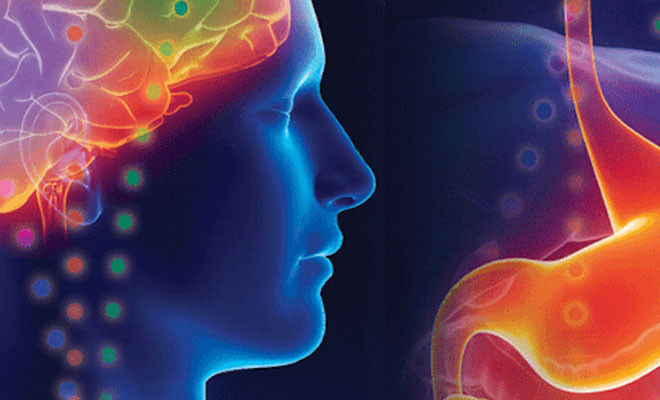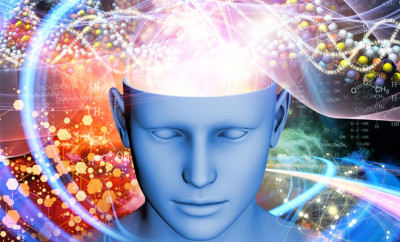
Our Second Brain
Searching for fulfillment and contentment in our lives is on most people’s life agenda. Many have found support and empowerment through coaching and other wellness modalities. As a Health Coach, I am an advocate/passionate about anything that affects mind, emotions and behaviour because these are the foundations of how we author the story of our lives.
Over the last few years much research has emerged to validate a humble adjunct to the cognitive behavioural sciences. Deep down in our very own bodies we hold another critical part of the jigsaw, according to medical research. You will be amazed to discover that an average adult carries 2kg of probiotic microbes in their intestines. A delicately balanced micro-system exists here so that physical and mental health creating microbes predominate. Our gut ecology affects our brain function through the Gut-Brain Axis.
Your gut is your second brain
In a very real sense our gut is like our second brain, it can significantly alter our emotional wellbeing, thinking and behaviour.
How can this be?
Science has shown us that during foetal development, the brain (central nervous system) and the intestines (enteric nervous system) are made from the same tissue (the neural crest). These two systems connect and communicate through one of the most important nerves: the vagus nerve. The vagus nerve runs down from your brain (brain stem) down into your intestines and this is how the gut communicates with your brain. This relationship explains why you get ‘butterflies’ in your stomach when you are nervous. Sandra Blakeslee’s plain English explanation in 1996 New York Times article ‘Complex and Hidden Brain in Gut Makes Stomachaches and Butterflies’ explores this concept.
More specifically, gut microbes stimulate the vagus nerve by a localized reaction in the lining of the small intestine, explains Prof Michiel Kleerebezem of NIZO food research. This stimulation to the vagus nerve might be soothing, irritating, disruptive etc., and this information travels up to activate the brain chemistry for better or worse. This is confirmed in “August 29 issue of Proceedings of the National Academy of Sciences.”
Mental-Emotional Health begins at birth
The Gut-Brain Axis has been around for some time, yet confirmation of the next phase of this phenomena: the gut flora’s (probiotics) impact on mood, learning, thinking and behavior is more recent.
A baby gathers its initial probiotic microbes as it travels through the vaginal canal at birth. Therefore, the QUALITY of the mother’s probiotic microbes is vital. These initial probiotic microbes go on to colonise the baby’s intestines.
In a study published in 2011, the authors explain the gut flora’s impact on the brain:
“Acquisition of intestinal microbiota in the immediate postnatal period has a defining impact on the development and function of the gastrointestinal, immune, neuroendocrine and metabolic systems. For example, the presence of gut microbiotaregulates the set point for hypothalamic-pituitary-adrenal (HPA) axis activity.”
HPA activity governs stress and its effect on digestion, immunity, energy, mood and emotions. The neurotransmitter, serotonin activates the HPA axis. Serotonin influences mood control, depression and aggression. Guess where the greatest concentrations of serotonin are found?
…In our gut!
Equally as powerful is this observation
“Bacteria colonize the gut in the days following birth, during a sensitive period of brain development, and apparently influence behavior by inducing changes in the expression of certain genes.”
Infants born to mothers with imbalanced vaginal microflora are susceptible to compromised immunity from birth. Unless healthy gut flora is established in early infancy, a child may suffer permanently altered gene expression, altered behavior and psychology as well as potentially being more prone to vaccine damage.
So it makes sense to nourish your gut flora as part of your pre-natal wellness plan and daily routine to support your mood, health and behavior. Many women in child bearing years have less than optimal gut flora. We will explore why further on.
Yo GABA GABA
GABA is the main chemical (neurotransmittor) in the brain that calms down brain activity. It has many affects including regulating sleep, relaxation, anxiety and muscle tension.
Long term use of the probiotic Lactobacillus rhamnosus was found to have a marked effect on GABA levels and lowered the stress hormone corticosterone which resulted in calmer anxiety and depression related behavior.
Medical Pioneers
Dr Natasha Campbell-McBride believes that the link between physical and mental health, the food and drink that we take, and the condition of our digestive system is absolute and the results of her work have supported her position on this subject. As a result of this conviction and helping her child recover from Autism, Dr Campbell-McBride set up The Cambridge Nutrition Clinic in the United Kingdom in 1998.
Dr. Andrew Wakefield and his team at the Royal Free Hospital in London in the late 90s found an inflammatory condition in the bowel of autistic children, which they have named Autistic Enterocolitis. Schizophrenic patients were always known to have serious digestive problems. Dr. Curtis Dohan, MD has devoted many years to researching digestive abnormalities in schizophrenia. He found a lot of similarities between coeliac disease and the state of the digestive tract in schizophrenics.
Not Just Small Adults
Childrens are particularly susceptible to gut-brain dysfunction as their gut, brain and immune systems are still developing.
A child’s blood-brain barrier is still very porous until at least two years of age. This means chemicals that cannot pass through an adults blood-brain barrier, can pass through a child’s one and affect brain function in the form of disrupted learning, thinking, behaving and feeling.
A child’s digestive lining is still porous allowing toxins which are intended to leave the body in urine and stools end up ‘leaking’ back into the general bloodstream whilst in the digestive tract, finding their way back up to the brain. This can be the trigger of allergies and inflammation.
A child’s liver detoxification pathways are immature and not very effective at handling even a minimal toxin exposure. These destructive toxins re-circulate in the blood including the brain.
What interferes with healthy gut microbes?
It will come as no surprise to you that gut microbes are extremely sensitive to our diets and lifestyles. Sugary drinks feed bad bacteria and yeasts. Processed foods in general will destroy healthy microflora. Non-organic dairy, meat, chicken, fish, fruit, vegetables, nuts and seeds are all subjected to antibiotic spraying or administering. We simply can’t get away from constant exposure to antibiotics.
Our gut flora is also very sensitive to:
- Antibiotic medicine for humans
- Chlorinated water
- Antibacterial detergents
- Agriculture chemicals
- Pollution and toxins
- Synthetic estrogens e.g. oral contraceptive pill, hormone replacement therapy
- Stress
Enhancing our gut flora with probiotic foods
There are two compelling reasons for taking care of our gut ecology – our mental-emotional wellbeing and the fact that 85% of our immunity is located in our gut.
Cultured foods like yogurt, some raw milk cheeses, and sauerkraut are good sources of natural, healthy probiotics, provided they are not pasteurized. And fermented foods, such as natto, cangive your body the similar benefits of consuming a whole bottle of good bacteria, at a fraction of the cost. You could also try your hand at making fermented raw vegetables. The expensive short cut is to take a high quality probiotic supplement.
Mirrors between mind and gut
Through Health Coaching we investigate a persons’ unique and mental – emotional responses that trigger our digestive system in an unhealthy manner. Illnesses that cause inflammation, spasms, infection and allergic responses in the digestive tract can have a correlation around the concept of insecurity, the concept of fear, the concept of letting go of something or someone, the concept of holding on, mental – emotional irritation about something, the concept of integration and assimilation. What are your unique triggers that affect your gut?
Taking care of our gut ecology alone is less likely to create lasting mental, emotional, behavioural results. A more reliable approach is to combine digestive system care with coaching to achieve lasting change.
NUTRA ingredients.com 15 September 2010, Proceedings of the National Academy of Sciences (PNAS)
Neurogastroenterology & Motility March 2011; 23(3); 255-e119
Neurogastroenterology & Motility March 2011; 23(3); 255-e119
Ingestion of Lactobacillus strain regulates emotional behaviour and central GABA receptor expression in a mouse via the vagus nerve. Bravo JA, Forsythe P, Chew MV, Escaravage E, Savignac HM, Dinan TG, Bienenstock J, Cryan JF. Source: Laboratory of NeuroGastroenterology, Alimentary Pharmabiotic Centre, University College Cork, Cork, Ireland







